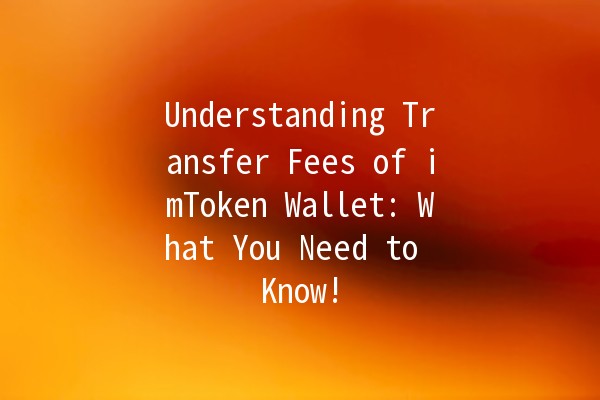imToken is a digital wallet that enables users to manage their cryptocurrencies easily. It supports multiple blockchain networks and offers a userfriendly interface for crypto enthusiasts. One of the key aspects of using any cryptocurrency wallet is understanding the fees associated with transferring assets. In this article, we will delve into the transfer fees of the imToken wallet, providing valuable insights and practical tips to optimize your transfer experience.
Transfer fees are charges incurred when sending cryptocurrencies from one wallet to another. These fees can vary significantly based on several factors, including the cryptocurrency being sent, network congestion, and the chosen transfer method. Understanding these fees is essential for effective financial planning in cryptocurrency transactions.
Different cryptocurrencies have different fee structures. For example, Bitcoin transactions may have higher fees during peak times compared to Ethereum or other altcoins. Understanding these differences can help users choose the right cryptocurrency for their transactions.

The amount of activity on a blockchain network can significantly affect transaction fees. During times of high demand, users may need to pay higher fees to prioritize their transactions. Monitoring network congestion can help users select the optimal time for transferring their assets.
Users can often choose between different transfer speeds. Opting for a slower transfer may result in lower fees, whereas instant transfers typically incur higher charges. Understanding the tradeoffs can help users save money on fees.
To ensure that your cryptocurrency transactions are as costeffective as possible, consider the following practical tips:
Explanation: Transfer fees can fluctuate based on network activity. Time your transactions during offpeak hours when fewer users are sending assets.
Example: For Bitcoin, avoid transferring in the evening or on weekends when network congestion is typically higher.
Explanation: Some cryptocurrencies have lower transaction fees than others. By choosing a cryptocurrency with a more favorable fee structure, you can save on transfer costs.
Example: Instead of sending value in Bitcoin, which may incur high fees, consider using a cryptocurrency like Litecoin or Stellar, which often have lower fees.
Explanation: imToken offers a feature that allows users to adjust their transaction fees. Utilizing this option helps find a balance between transfer speed and cost.
Example: If you do not need an instant transaction, you can set a lower fee to save money while waiting for the transfer to process.
Explanation: If you need to send multiple transactions, consider batching them together if supported by the wallet. This can reduce the overall fees as you may only pay once for multiple transactions.
Example: Instead of sending ten payments individually, send them in a single transaction to one address with change returned to your wallet.
Explanation: Keeping an eye on cryptocurrency trends and market conditions can help you determine the best time to transfer assets.
Example: If you notice a sudden drop in transaction fees due to decreased network use, act quickly to send your cryptocurrencies.
Many users find it challenging to navigate the various fee structures associated with cryptocurrency transactions. imToken provides detailed breakdowns of fees during the transfer process, making it easier for users to understand. This transparency is crucial in helping users make informed decisions.
Fees associated with cryptocurrency transactions may be considered deductible under certain tax regulations, depending on your local laws. Keep accurate records of your transactions, including fees paid, as this information may be beneficial for tax reporting purposes.
While there is typically no formal maximum fee set by wallets or cryptocurrencies, excessive fees can deter users from making transactions. It's essential to evaluate fees in relation to the value of the transaction to ensure that they make financial sense.
Transaction fees are calculated based on several factors including data size and urgency of the transfer. Each cryptocurrency network has its own algorithm for determining fees, which can complicate the understanding of fees for end users. Users can often find calculators or tools online to estimate fees before initiating a transfer.
If you set too low a fee, your transaction may take longer to process, or it could even become stuck in the queue. In some instances, transactions can time out if not processed within a certain timeframe. Users should aim for a competitive fee to ensure timely processing of their transactions.
Once you initiate a transfer and set your fee, the fee will not change, but the transaction may take longer to process if the network becomes congested. It's crucial to monitor the network conditions before finalizing any transfers to avoid prolonged waits.
Understanding the transfer fees associated with the imToken wallet is essential for any cryptocurrency user. By monitoring network conditions, choosing the right transfer times, and utilizing imToken's features, users can minimize their expenses and make the most of their cryptocurrency transactions. Adapting transfer strategies based on the factors influencing fees will not only save money but also enhance the overall user experience with digital assets.
This article serves as an excellent resource for both novice and experienced users seeking to navigate the often complex world of cryptocurrency transfer fees within the imToken wallet environment.